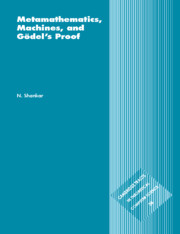4 - The Representability of the Metatheory
Published online by Cambridge University Press: 16 October 2009
Summary
We shall give only an outline of the proof of this theorem because the proof does not present any difficulty in principle and is rather long.
Kurt Gödel [Göd67b]The climactic step in Gödel's proof of the incompleteness theorem is the construction of a sentence asserting its own unprovability. Since provability is a metatheoretic notion, the construction of such a sentence within Z2 requires that some part of the metatheory of Z2 be represented within Z2 itself. The main result of this chapter is an outline of the proof of the representability of the metatheory of Z2 (as described in Chapter 2) within Z2. The formalization of the representability theorem is perhaps the single most substantial and difficult part of our mechanical verification. The machinery of derived inference rules developed in Chapter 3 is heavily exploited in the representability proofs. The representability theorem is used in the construction of the undecidable sentence in Chapter 5.
The contents of this and the succeeding chapter are quite complicated since they define and use a seemingly unmanageable variety of encodings. One encoding represents the syntax of Z2 expressions using only numbers and the pairing operation of Lisp, and another encoding represents these latter Lisp data structures as sets in Z2. The representability theorem then shows the correspondence (under the encoding) between the metatheoretic Lisp computations and certain kinds of proofs in Z2.
A Brief Overview
We saw in Chapter 2 how the metatheory of Z2 could be formalized in terms of Lisp functions such as Collect-Free, Subst, Prf, and Proves.
Information
- Type
- Chapter
- Information
- Metamathematics, Machines and Gödel's Proof , pp. 91 - 124Publisher: Cambridge University PressPrint publication year: 1994
